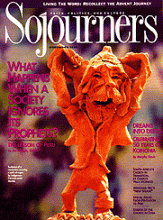In a September gathering that Nobel Peace Laureate Adolfo Perez Esquivel described as "the Pentecost of Latin America," 500 delegates celebrated the first Latin American and Caribbean meeting of the Assembly of the People of God (Asamblea del Pueblo de Dios, or APD). The delegates were elected by national assemblies in 20 countries in the region as part of an ongoing process of reflection and action on 500 years of Christian presence in the Americas.
The gathering took place outside of Quito, Ecuador, in a church camp that had surely never seen a revival quite like this one. The APD is directly tied to the prophetic tradition of giving voice to the voiceless, the forgotten, the marginalized. But in the ongoing APD process the region's poor majority is speaking for itself and making its own discoveries.
The message was one of courage and determination, but also of the pain of those for whom survival is a daily challenge. A woman from Costa Rica's Atlantic coast denounced that the International Monetary Fund's (IMF) strategy for the elimination of poverty is simple: Eliminate the poor, imposing austerity measures that undermine their very survival.
In one discussion after another, people talked about how the neoliberal economic policies now in vogue have rendered surplus millions of Latin America's poor. These people no longer have a constructive role to play in current development plans. Moreover, they are regarded as a burden, and they are indeed dying in increasing numbers as a result of IMF-mandated cuts in food subsidies, sanitation, health care, and other social spending.
Read the Full Article

